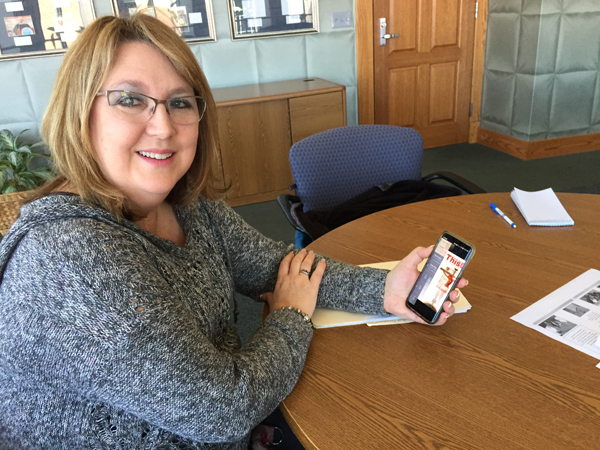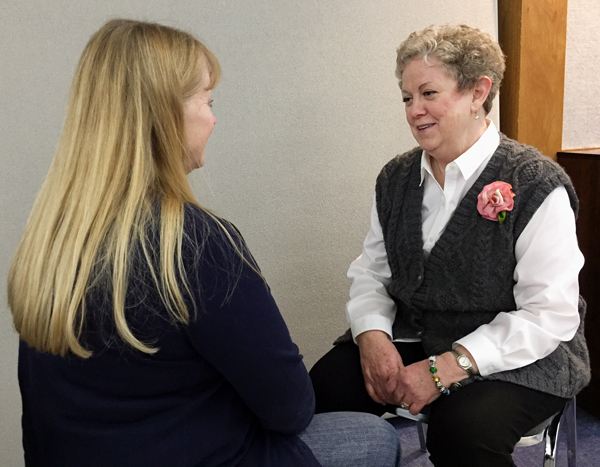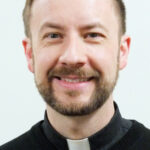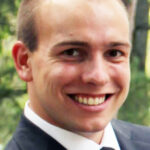By Barb Arland-Fye
The Catholic Messenger
Spiritual Director Helen Schiltz observes that most people in the second half of life “are trying to find out, ‘How do I connect with the divine?’” Younger people may ask that question, too, but the urgency to find an answer becomes more intense in mid-life, says Schiltz of St. Paul the Apostle Parish in Davenport.

Soon-to-be spiritual director Tammy Norcross-Reitzler shows an app for a daily prayer booklet.
For some people, the quest leads to a desire for spiritual direction, “a process through which one shares one’s spiritual journey with an experienced — and presumably wise — person who has the training and aptitude for careful listening and reflection.” (www.foryourmarriage.org/spiritual-direction)
Spiritual direction “helps me to see God’s action in my life,” says Tammy Norcross-Reitzler, a campus minister at St. Ambrose University in Davenport. She receives spiritual direction from Schiltz, who earned her credentials after completing a master of pastoral studies at Aquinas Institute of Theology in St. Louis.
Norcross-Reitzler has also discerned a call to be a spiritual director and is completing studies through Benedictine Peace Center in Yankton, S.D. She anticipates certification in April. “A spiritual director is a companion who listens to you and helps you to sort out what’s of God and what’s not of God,” she reflects. “If you want to grow closer to God, you would benefit from spiritual direction.”
Among the benefits she has discovered: a growing awareness of her reactions to people and to situations and how to bring that to prayer. “I’m more aware of God seeking me and desiring me to be in relationship with God. As much as I want to be in relationship with God, God is seeking me even more than that!”
Norcross-Reitzler responds to God’s invitation through prayer, the sacraments and Scripture. “Once your eyes are open, the words pop out in Scripture.” Her favorite form of prayer is Lectio Divina, or praying with Scripture. “I’m just amazed how God speaks to me through Scripture.”
Spiritual directors and directees typically meet once a month for about an hour, usually in a space that allows for privacy because of the personal nature of the conversation. “God is in all aspects of life,” Norcross-Reitzler notes. While spiritual directors and their directees can be of the opposite sex, Schiltz and Norcross-Reitzler feel more comfortable with same-gender spiritual direction.
The word “direction” is a bit of a misnomer. “A lot of people think spiritual directors will give you direction and tell you what to do. They do not; they help you by asking you questions so that you can discern the answers,” Norcross-Reitzler says.
Spiritual direction is not counseling, but rather an ongoing journey of faith in which the central question is: “Where is God in all of this?” says Schiltz.
Good listening skills are essential for a spiritual director, who is listening to God as well as the directee. “Every good spiritual director needs their own prayer practice, their own spiritual director, and they also need supervision,” Schiltz says. She travels to Cedar Rapids, Iowa, monthly to meet with other spiritual directors, and hopes to see a group formed closer to home.

Spiritual director Helen Schiltz, right, a member of St. Paul the Apostle Parish-Davenport, observes that most people in the second half of life “are trying to find out, ‘How do I connect with the divine?’” Spiritual direction “is a process of learning to trust that God is speaking to us.”
At the spiritual directors’ meeting, each one takes turns discussing a challenge they may have experienced with a directee. “The other directors aren’t going to solve the problem, but ask you questions that help you get to the answer yourself,” Schiltz says. “It’s a way of keeping your own issues separate from your directees.”
Bishop Thomas Zinkula has long appreciated the value of spiritual direction. “Prior to my appointment as bishop, I had been accepted into the Spiritual Direction Training Program, which is offered by Creighton University at Mundelein Seminary near Chicago. I wanted to participate in this three-year program, in which priest participants gather for weeklong sessions three times a year, for three reasons: 1) To become a better spiritual director; 2) To strengthen my priestly ministry in general; 3) Selfishly, to grow spiritually in my own personal life. So I obviously value spiritual direction, both as director and directee. After my appointment, I asked Archbishop Michael Jackels (of the Archdiocese of Dubuque) if, given the duties of a bishop, he thought I would be able to do this program. He simply smiled and shook his head ‘no!’”
Spiritual direction is part of the formation process for individuals discerning vocations to the priesthood, diaconate or religious life. Other individuals tend to think that God speaks only to priests, theologians or spiritual writers. “God speaks to all of us,” Schiltz says. “Spiritual direction is a process of learning to trust that God is speaking to us. There are spiritual directors from all faiths. It’s not as much about religion as spirituality. All of us are trying to find our way home.”
Spiritual Direction collaboration
Benet House Retreat Center at St. Mary Monastery in Rock Island, Ill., is collaborating with St. John’s University in Collegeville, Minn., to offer a certificate of Spiritual Direction through the university’s Graduate School of Theology. Benet House will become a cohort of the university to offer the certificate program. It is a hybrid program (online and on-campus classes). On-campus classes may be held at Benet House, for area residents’ convenience. Individuals of any faith interested in learning more about this graduate certificate program may contact Sister Bobbi Bussan, OSB, at rbussan@smmsisters.org or call (309) 283-2109.
For a list of spiritual directors, go to http://www.catholicmessenger.net/2018/03/eastern-iowa-western-illinois-spiritual-directors/ .












Excellent information. thank you.